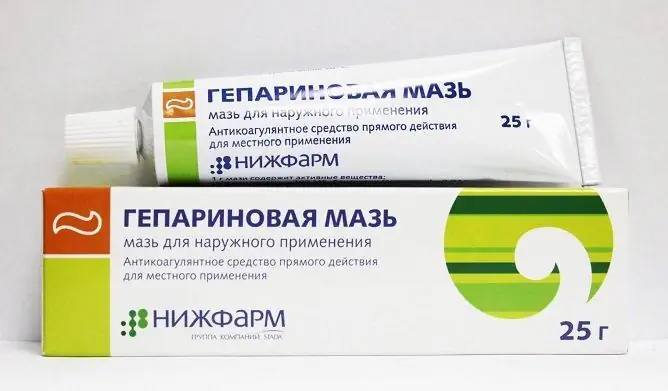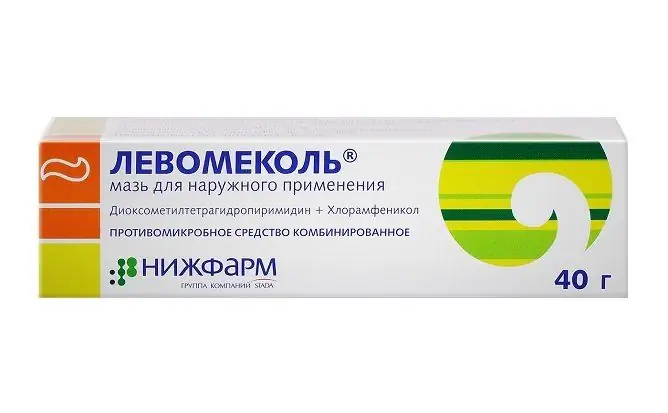- Author Rachel Wainwright wainwright@abchealthonline.com.
- Public 2023-12-15 07:39.
- Last modified 2025-11-02 20:14.
Acyclovir-Acri
Acyclovir-Acri: instructions for use and reviews
- 1. Release form and composition
- 2. Pharmacological properties
- 3. Indications for use
- 4. Contraindications
- 5. Method of application and dosage
- 6. Side effects
- 7. Overdose
- 8. Special instructions
- 9. Application during pregnancy and lactation
- 10. In case of impaired renal function
- 11. Use in the elderly
- 12. Drug interactions
- 13. Analogs
- 14. Terms and conditions of storage
- 15. Terms of dispensing from pharmacies
- 16. Reviews
- 17. Price in pharmacies
Latin name: Aciclovir-Akri
ATX code: D06BB03
Active ingredient: Acyclovir (Aciclovir)
Producer: JSC Sintez, JSC Akrikhin, LLC Ozon, LLC Alvils, JSC Tatkhimfarmpreparaty, JSC Altayvitamins, JSC Nizhpharm, JSC Vertex, RUE Belmedpreparaty (Russia); LLC Astrafarm, PJSC Darnitsa, PJSC Farmak, LLC Farmex group (Ukraine)
Description and photo update: 2018-22-10
Prices in pharmacies: from 35 rubles.
Buy

Acyclovir-Acri is an antiviral drug.
Release form and composition
Dosage forms of Acyclovir-Acri:
- tablets (10 pcs. in a blister strip, in a cardboard box 2 or 3 packages; 20 pcs. in a glass jar of dark color, in a cardboard box 1 can);
- ointment for external use 5% (2, 3, 5, 10 or 30 g in an aluminum tube, in a cardboard box 1 tube);
- cream 5% (2, 5 or 20 g in a tube, in a cardboard box 1 tube).
The active ingredient of Acyclovir-Acri is acyclovir:
- 1 tablet: 0.2 g, 0.4 g;
- 1 g ointment: 0.05 g;
- 1 g cream: 0.05 g.
Pharmacological properties
Pharmacodynamics
Acyclovir is a synthetic analogue of an acyclic purine nucleoside, has a high degree of selective action on herpes viruses. The transformation reactions of acyclovir into mono-, di- and acyclovir triphosphate sequentially occur under the action of viral thymidine kinase inside virus-infected cells. After that, acyclovir triphosphate is incorporated into the viral DNA chain (deoxyribonucleic acid) and, by competitive inhibition of viral DNA polymerase, blocks its synthesis.
In vitro activity of acyclovir against the virus Varicella zoster, Herpes simplex (types 1 and 2) and in higher concentrations - the Epstein-Barr virus was established.
In vivo, the therapeutic and prophylactic effect of acyclovir has been confirmed against viral infections caused by Herpes simplex.
Acyclovir-Acri prevents the formation of new elements of the rash, reduces the likelihood of the spread of the skin pathogen and visceral complications, accelerates the formation of crusts, and helps to relieve pain in the acute phase of herpes zoster.
Pharmacokinetics
When taken orally tablets Acyclovir-Acri, absorption of the drug in the gastrointestinal tract is 20%. There is a relatively weak binding of acyclovir to plasma proteins.
The average elimination half-life is 3 hours.
In cerebrospinal fluid, the concentration corresponds to 50% of the level in blood plasma. In the process of biotransformation of acyclovir, 9-carboxymethoxymethylguanine is formed.
Through the kidneys, 10-15% of the drug is excreted in the form of a metabolite or unchanged.
Indications for use
- infections of the skin and mucous membranes caused by the Herpes simplex virus (types 1 and 2), including primary and secondary genital herpes;
- primary and recurrent infections caused by the Varicella zoster virus (shingles, chickenpox);
- severe immunodeficiency after bone marrow transplantation and with HIV infection (early clinical manifestations, stage of AIDS, detailed clinical picture) - as part of complex therapy;
- prevention of primary and recurrent infections caused by the Herpes simplex virus (type 1 and 2) in immunocompromised patients;
- prevention of exacerbations of recurrent infections caused by the Herpes simplex virus (types 1 and 2) in patients with normal immune status.
Contraindications
- period of pregnancy;
- breast-feeding;
- hypersensitivity to ganciclovir and drug components.
With caution, Acyclovir-Acri should be prescribed for neurological disorders (including history), dehydration, renal failure.
Instructions for use of Acyclovir-Acri: method and dosage
Pills
Acyclovir-Acri tablets are taken orally during or immediately after a meal with plenty of water.
The dosage regimen is prescribed by the doctor individually, taking into account the clinical indications and the severity of the patient's condition.
Recommended dosage:
- treatment of infections of the skin and mucous membranes caused by the Herpes simplex virus (type 1 and 2): patients over the age of 2 years - 0.2 g 5 times a day (every 4 hours during the day and at intervals of 8 hours at night) … The duration of the course is 5 days, if necessary, the treatment can be extended;
- severe immunodeficiency, including a detailed clinical picture of HIV infection (including the early manifestation of HIV infection and the AIDS stage), after bone marrow transplantation (as part of complex therapy): 0.4 g 5 times a day;
- prevention of recurrence of infection caused by the Herpes simplex virus (type 1 and 2) in patients with normal immune status: 0.2 g 4 times a day every 6 hours;
- prevention of infection caused by the Herpes simplex virus (type 1 and 2) in immunocompromised patients over 2 years old: 0.2 g 4 times a day (with an interval of 6 hours), the maximum daily dose is 0.4 g 5 times per day;
- treatment of infections caused by the Varicella zoster virus: adults and children weighing more than 40 kg - 0.8 g 5 times a day (every 4 hours during the day and 8 hours at night). The duration of the course is 7-10 days. Children over 2 years old - at the rate of 0.02 g per 1 kg of body weight 4 times a day. The course of treatment is 5 days;
- treatment of herpes zoster (Herpes zoster): adults and children over 6 years old - 0.8 g 4 times a day (with an interval of 6 hours) for 5 days. Children 2-6 years old - 0.4 g 4 times a day. Children under the age of 2 years - 0.2 g 4 times a day. The individual dose of the drug can be more accurately determined using the calculation of 0.02 g per 1 kg of patient weight. The maximum daily dose is 3.2 g. The course of treatment is 5 days.
With moderate and severe renal dysfunction, a decrease in the daily dose of the drug is required.
Ointment for external use 5% and cream 5%
The drug in the form of a cream and ointment Acyclovir-Acri is intended for external use by applying a thin layer to the affected area of the body surface.
Recommended frequency of procedures: 5 times a day (every 4 hours) for 5-10 days.
Side effects
- from the central nervous system: rarely - weakness, headache; isolated cases - drowsiness, fatigue, dizziness, hallucinations, tremors;
- allergic reactions: skin rash;
- from the digestive system: rarely - a transient increase in the activity of liver enzymes, hyperbilirubinemia; isolated cases - nausea, abdominal pain, vomiting, diarrhea;
- on the part of the hematopoietic system: rarely - erythropenia, leukopenia;
- allergic reactions: skin rash;
- others: rarely - fever, alopecia, an increase in the concentration of urea and creatinine in the blood.
In addition, against the background of the use of the ointment, the following undesirable effects may develop:
- allergic reactions: rarely - allergic dermatitis;
- local reactions: tingling or burning, redness, itching, flaking of the skin.
Overdose
Overdose symptoms have not been established.
special instructions
During the period of taking Acyclovir-Acri, the patient should drink a sufficient amount of liquid to provide the body with a regime of increased hydration. Careful monitoring of renal function, blood urea and plasma creatinine levels is required.
Conducting multiple courses of treatment in immunocompromised patients can cause the formation of viral resistance to the active component.
Acyclovir-Acri ointment should not be applied to mucous membranes, including the genitals, oral cavity and eyes, as this can cause the development of severe local inflammation.
The use of the ointment should be started when the first symptoms of the disease appear, this increases its therapeutic effect.
Influence on the ability to drive vehicles and complex mechanisms
During the period of treatment, care should be taken when performing potentially hazardous activities, including driving vehicles and mechanisms, since there is a risk of developing adverse events from the nervous system.
Application during pregnancy and lactation
The drug overcomes the hematoplacental barrier, therefore, it is contraindicated to use it during pregnancy.
Prescribing Acyclovir-Acri during gestation is possible only in a special case when, in the opinion of the doctor, the expected clinical effect of therapy for the mother exceeds the potential threat to the fetus.
Since acyclovir is excreted in breast milk, the use of the drug during lactation is contraindicated.
With impaired renal function
According to the instructions, Acyclovir-Acri should be used with caution in the treatment of patients with renal failure.
With moderate and severe renal dysfunction, a decrease in the daily dose of the drug is required.
Treatment and prevention of infections caused by the Herpes simplex virus in patients with severe renal impairment, with creatinine clearance (CC) less than 10 ml / min should be carried out at a dose of 0.2 g 2 times a day (every 12 hours).
In the treatment of infection caused by the Varicella zoster virus, with CC 10-25 ml / min, the patient is prescribed 0.8 g 3 times a day (every 8 hours), with CC less than 10 ml / min - 0.8 g 2 times per day.
Use in the elderly
Since the elimination half-life of acyclovir may increase in elderly patients, they should use Acyclovir-Acri with caution.
Drug interactions
With the simultaneous use of Acyclovir-Acri inside:
- probenecid increases the average elimination half-life and decreases the clearance of acyclovir;
- nephrotoxic drugs increase the risk of developing functional renal disorders.
Interaction has not been established when the external forms of the drug are combined with other drugs.
Analogs
Analogs of Acyclovir-Acri are: tablets, capsules, injection solution - Valtrex, Valcyte, Arviron, Vacirex, Vero-Ribavirin, Valacyclovir, Minaker, Rebetol, Ribamidil, Ribavin, Ribapeg, Ribavirin, Trivorin, Familarvir, Fimamilarvir cream, ointment - Alpizarin, Bonafton, Vartek, Viru-Merz, Gerpferon, Hyporamine, Gossypol, Devirs, Imiquimod, Lomagerpan, Condilin, Oxolin, Fenistil Penzivir, Fladex, Helepin-D, Epigen, Erazaban.
Terms and conditions of storage
Keep out of the reach of children.
Store in a place protected from moisture and light at a temperature: tablets - up to 25 ° C, ointment and cream - 8-15 ° C.
Shelf life: tablets - 3 years, ointment and cream - 2 years.
Terms of dispensing from pharmacies
Dispensed by prescription.
Reviews about Acyclovir-Acri
Reviews about Acyclovir-Acri are mostly positive, the drug is especially effective when used from the moment the first symptoms of a viral infection appear.
The price of Acyclovir-Acri in pharmacies
Price for Acyclovir-Acri:
- 200 mg tablets (20 per pack) - about 60 rubles;
- 400 mg tablets (20 per pack) - 200 rubles;
- ointment (1 tube): 2 g - approximately 25 rubles, 3 g - 30 rubles, 5 g - 40 rubles.
Acyclovir-Acri: prices in online pharmacies
|
Drug name Price Pharmacy |
|
Acyclovir-Acri 5% ointment for external use 5 g 1 pc. 35 RUB Buy |
|
Acyclovir-Acri 400 mg tablets 20 pcs. 248 r Buy |

Maria Kulkes Medical journalist About the author
Education: First Moscow State Medical University named after I. M. Sechenov, specialty "General Medicine".
Information about the drug is generalized, provided for informational purposes only and does not replace the official instructions. Self-medication is hazardous to health!






